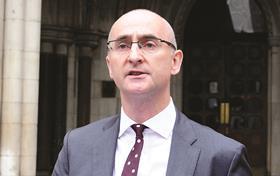A rather unwise decision to pursue science-based A-levels led me to a junior fee-earning position with a young and progressive practice named Jones Maidment Wilson. I was fortunate to stumble into a firm (and a profession) that would allow me to make the best use of my abilities. The partners offered me great encouragement and guidance.

As a young litigator (21) I was handling serious and complex Crown court cases. I was not admitted at that stage, though my employers encouraged me to return to (part-time) education. Graduation followed, thanks to a four-year stint at night school.
My period of formal legal training was somewhat unusual. I arrived at law college with more than 10 years’ experience as a criminal litigator. An opportunity during training to focus on other areas of law was welcome. My goal was to qualify as a solicitor with a view to devoting the balance of my career to the representation of those accused of, or charged with, criminal offences.
Some of the most challenging professional experiences have not involved law. The challenge of operating a business has become increasingly difficult; more regulation at a time of falling income (at least through legal aid) is very difficult. It is perhaps the exhausting balance of handling significant cases while running a business that provides for the greatest overall challenge.
My representation of Ched Evans is a highlight. Having first met Mr Evans at HMP Wymott in 2014, it was a tremendous experience to make a successful application to the Criminal Cases Review Commission. How memorable it was to be present (in April 2016) when the Court of Appeal formally quashed the conviction (for rape) that had been recorded against him in April 2012. Furthermore, there came a moment of great professional pride when he was finally acquitted by a jury at Cardiff Crown Court in October 2016.
It must be accepted that there is no ‘money tree’ where legal aid is concerned
Appearing as an advocate before the Court of Appeal also evokes fond memories. So does my representation of those individuals, professional and otherwise, of whose innocence I was completely confident. Challenging as those cases are, when they are successfully defended I feel the same sense of pride and achievement as when I first entered the profession in the 1980s.
New laws occasionally cause irritation and uncertainty as to whether they might be fair to all parties. However, experience tells us that legislative changes, even when unwanted, have to be accepted and dealt with appropriately.
I’m not certain that some of the procedural changes we have seen in relation to criminal practice have improved the position as it may have been some 10 or 20 years ago.
The greatest loss is the worrying numbers of those who have chosen to leave the profession. All practices across the country will have lost talented lawyers and litigators, disillusioned with legislative change and cuts to funding. I hope the work undertaken, particularly by legal aid lawyers, will be properly recognised in the future and that talented young people might once again be tempted to join their ranks.
It must be accepted, perhaps with regret, that there is no ‘money tree’ where legal aid is concerned. The budget must be limited, like other public service budgets.































No comments yet